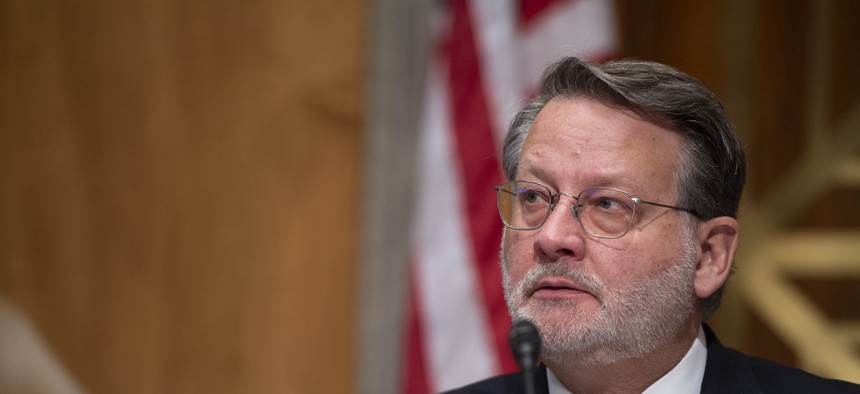New Senate Bill Aims to Improve Federal Coordination With States and Localities

U.S. Sen. Gary Peters of Michigan Getty Images
The measure has bipartisan support, but similar efforts in recent years have fizzled. Will this push be different?
A bipartisan group of senators led by the chairman of the Senate’s government operations committee is pushing to improve coordination between Washington and state and local governments to reduce waste and duplication.
New legislation sponsored by Sen. Gary Peters, a Michigan Democrat, would require two federal entities, the Office of Management and Budget and the White House Office of Intergovernmental Affairs, to develop a strategic plan to increase coordination between the federal government and state, local and tribal governments.
The proposal takes a different approach than failed legislation from a few years ago that sought to revive a defunct commission that was designed to foster cooperation between federal policymakers and states and localities.
According to a release, the aim is to ensure tax dollars are not spent on unnecessary resources to execute core government responsibilities.
An aide to Peters, chairman of the Senate Homeland Security and Governmental Affairs Committee, said the aim of the bill is for the White House to figure out what states and localities need. But the lawmakers said the measure could lead to creating new IT capabilities, data sharing and other services to root out waste, fraud and abuse of taxpayer funds.
“This commonsense, bipartisan bill will increase cooperation between all levels of government to improve the ability of state and local governments to provide critical services more efficiently and save taxpayer dollars as they help carry out many federal programs,” Peters said in the release.
Senators Steve Daines, a Montana Republican, and Arizona Democrat Kyrsten Sinema co-sponsored the measure.
The National Conference of State Legislatures and the U.S. Conference of Mayors said they were still studying the bill.
But NCSL spokesman Mick Bullock said the group would like to see Congress put into law former President Bill Clinton’s 1999 executive order on federalism, which among other things required federal agencies when enacting new rules to provide funding for states and localities to implement them, to assess their impact on the governments and to consult with state and local leaders.
Counties also said that increasing federal coordination with local governments should include requiring more consultation with the associations representing state and local governments.
Mayors also said they hoped the bill would lead to changes in how federal dollars are distributed.
“Direct funding to cities is more efficient, cost-effective and provides more accountability than going through multiple levels of bureaucracy,” Tom Cochran, the Conference of Mayors’ CEO and executive director, said in a statement.
The bill is the latest in the periodic attempts by members of Congress to improve federal coordination with the states and localities where their political careers got their start. Those efforts haven’t achieved much, though.
For example, in the 2017-18 timeframe, leaders in the House launched a task force to examine the balance between federal power and state and local government interests.
U.S. Rep. Gerry Connolly, a Virginia Democrat, and former congressman Rob Bishop, a Utah Republican, led the task force, and in 2019 introduced a bill that would’ve revived and reworked the U.S. Advisory Commission on Intergovernmental Relations. The commission was active between 1959 and 1996 and dormant since then.
But the bill to revitalize and update the panel failed to gain serious traction in Congress, even though the major associations representing state and local officials endorsed it.
Kery Murakami is a senior reporter for Route Fifty based in Washington, D.C.
NEXT STORY: Federal Pandemic Aid is Providing a Boost to City Housing Programs






